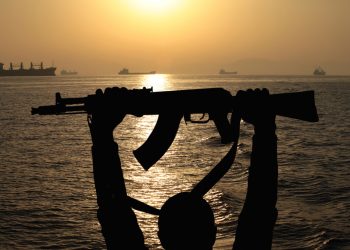According to reports from the International Maritime Bureau
 The twice-yearly monsoon seasons in the Indian Ocean no longer appear to be a deterrent to Somali pirate activity, according to reports from the International Maritime Bureau (IMB), although they continue to affect the seasonal pattern of piracy and location of attacks.
The twice-yearly monsoon seasons in the Indian Ocean no longer appear to be a deterrent to Somali pirate activity, according to reports from the International Maritime Bureau (IMB), although they continue to affect the seasonal pattern of piracy and location of attacks.
The IMB, which monitors piracy worldwide through its Piracy Reporting Centre (PRC), notes that although there was no reported piracy in the Indian Ocean during last summers monsoon season of June to August, there have been recent reports of pirate attacks on three vessels in the Indian Ocean during very rough seas approximately 450 nautical miles east of Socotra island, Yemen. Winds were reported to be force 7 with sea swells of approximately 4.5 metres. These are not normally conditions conducive to launching attacks from small attack skiffs, the IMB comments.
In preparation for the monsoon seasons, Somali pirates usually turn to calmer waters. In recent weeks there have been an increasing number of attacks on vessels in the Red Sea 11 since 20 May.
Despite the continuing attacks, the IMB notes that the pirates now have a poorer success rate, with the number of hijacks falling from one in four and a half vessels targeted in 2010 to one in just over seven vessels in 2011. This is attributed to more robust naval involvement and to increased ship protection measures.
In a recent incident on 10 June, a German warship disrupted a suspected pirate dhow and two attack skiffs during a routine patrol in the southern Somali basin. To prevent harm to any hostages on board the dhow, the warship opened fire on the two attack skiffs and sunk them to avoid their use in future pirate attacks.
There appears to be relief for the 29 seafarers held hostage on the Kuwaiti-owned, United Arab Emirates-flagged oil tanker Zirku, which is believed to have been freed from Somali pirates following the payment of a reported ransom of at least US$10 million. The crew of 17 Pakistani, three Egyptian, three Jordanian, two Ukrainian and Croatian, Filipino, Indian and Iraqi seafarers had been held since 28 March when the tanker was captured 250 nautical miles off Salalah, Oman.
There are also reports that Somali pirates have freed the Egyptian-owned, Panama-flagged Suez and its 24 Egyptian, Pakistani, Sri Lankan and Indian crew hijacked in the Gulf of Aden last August for a reported ransom of US$2.1 million. There were reports that the ship was subject to a further attempted pirate attack after it was freed.
Somali pirates continue to hold captive around 23 vessels and 439 hostages, according to IMB figures for 13 June. Hostages include seven Indian seafarers from the Asphalt Venture still held captive despite the payment of a ransom in April.
The IMB has also issued a warning to vessels transiting the South China Sea to be alert following the recent hijacking of three tugboats and a barge in these waters.
Other recent incidents reported to the IMBs worldwide Piracy Reporting Centre include:
- Four pirates in a skiff chased and fired on a cargo ship 26 nautical miles off the coast of Somali on 15 June. One pirate boarded the vessel but jumped overboard after the crew confronted him.
- Armed robbers boarded a chemical tanker anchored at Cotonou, Benin on 14 June, forced the captain to sail to an unknown location and stole ships property and escaped. In a similar incident in the port on 8 June, robbers stole some cargo as well as ships property.
- A robber boarded a bulk carrier anchored at Cartagena, Colombia on 13 June and was chased off by crew, who later noticed that ships stores had been stolen.
- Four pirates chased and fired on a bulk carrier 420 nautical miles off Socotra island, Yemen on 12 June but were deterred by effective anti-piracy measures, including fire hoses and an electric wire round the vessel.
- Robbers boarded a container ship anchored in the Suez Canal, Egypt on 12 June and stole ships property. The robbers were later found by the authorities and the property reclaimed.
- Seven pirates in a skiff approached a tanker 27 nautical miles off Eritrea in the Red Sea but abandoned an attempted boarding due to the high freeboard.
- Five pirates in a skiff chased a tanker 40 nautical miles off Eritrea on 11 June but moved away after the onboard security guard fired warning shots.
- Four pirates in a skiff fired on a bulk carrier 400 nautical miles off Socotra on 11 June but moved away after the onboard security team fired warning shots. In the same area some while later, pirates chased a chemical tanker but moved away after the onboard security team fired warning shots.
- Six pirates in a skiff chased and fired on a bulk carrier 30 nautical miles off Eritrea on 10 June but abandoned the attack after the vessel took anti-piracy measures.
- Seven pirates in a skiff chased and fired on a bulk carrier in the Gulf of Aden on 7 June. The crew mustered in the citadel, the onboard security team fired warning shots and a naval helicopter arrived at the location.
Source: ITF





























































